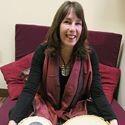Nuttall, Denise
Person Alternate Names
Denise I., Nuttall
Position
Faculty Member
Field of Activity
social and cultural anthropology
South Asia (India) and the South Asian Diaspora
anthropology of the body and embodiment
sensory ethnography
the anthropology of performance
the anthropology of music
postcolonial and transnational anthropology
Email/Contact
nuttalld@douglascollege.ca
Department
Education and Credentials
PhD, University of British Columbia
MA, University of Western Ontario
BA, York University
PhD, University of British Columbia
MA, University of Western Ontario
BA, York University


